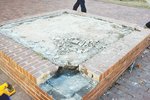

PITTSBORO — The “Our Confederate Heroes” monument removed from in front of the historic Chatham County Courthouse grounds 23 months ago remains somewhat in limbo, with interested parties still awaiting a decision from the N.C. Court of Appeals about the monument’s legal ownership.
In the meantime, the Confederate soldier statue — which stood guard for 112 years, facing north, slouch hat on its head and rifle butt resting on the ground — and its pedestal are locked within a Greensboro warehouse. Chatham County is footing its $300/month storage bill, its officials assuring anyone who asks that it’s been thoughtfully and carefully handled and is well-protected.
The 27-foot-tall monument — made of granite and copper mined from Mt. Airy and erected and dedicated back in 1907 at a cost of $1,700 — was removed from in front of the courthouse on the late evening and early morning of November 19-20, 2019, under dark, drizzly skies. The county paid more than $44,000 to have the monument carefully dismantled and transported, part of more than $200,000 in expenses related to maintaining security around the area of the monument during a months-long series of meetings, protests and demonstrations in Pittsboro that ultimately resulted in injuries, dozens of arrests and, for a time, statewide and some nationwide attention.
Time and seasons, a divisive election cycle, a global pandemic, worldwide protests over the killing of George Floyd, major construction projects in the courthouse area and fact that the monument is no longer there have factored into protesters largely keeping away for the past year from the area where the monument used to stand.
As for the monument itself, a few county officials are aware of its exact current location, but anyone who knows isn’t giving specifics. County Manager Dan LaMontagne, when asked whether members of the Winnie Davis Chapter of the United Daughters of the Confederacy — so far, deemed the monument’s legal owner — know where it’s stored, replied simply: “They know we have it.”
And the county is patiently biding time until the UDC — which, in turn and in court papers, says it gifted the monument to the county in 1907 — claims it.
Thus, the limbo part: Chatham County emerged as winner in the most recent court order involving the monument’s ownership. It argued, prior to a Dec. 4, 2019, court decision, that a license housed in the N.C. Archives from the time of the monument’s installation says that an agreement existed for the county to house the monument, but the monument would remain the property of the UDC. The monument being privately-owned on public land means its placement was not subject to a law the UDC claimed would prevent its removal from the grounds of the courthouse.
The Winnie Davis Chapter of the UDC appealed that decision. Since then, there’s been little to add.
Chatham County Attorney Bob Hagemann told the News + Record the case has been fully briefed in the N.C. Court of Appeals.
“However,” he said in an email message, “on March 18 the Court issued an order holding the case in abeyance pending the resolution of United Daughters of the Confederacy v. City of Winston-Salem, No. 21A21, by the North Carolina Supreme Court.”
The state Supreme Court has yet to rule on that case — a decision which would likely impact Chatham’s case, according to various county officials.
“The county (as defendant) received the decision in Chatham Superior Court that the county was, in fact, not the owner of the monument and therefore could remove it,” Chatham Commissioner Diana Hales told the News + Record. “Further, that the petitioners in this action (Daughters of Confederacy and other individuals) did not have legal ‘standing’ to bring the complaint. The Daughters of the Confederacy has appealed that decision and it is now in North Carolina Court of Appeals.”
Hales, part of a 4-1 board vote on Aug. 19, 2019, to terminate the county’s agreement with the UDC for the placement of the monument, said she didn’t know what the status was regarding additional potential hearings, nor whether a written opinion might come from the N.C. Court of Appeals after the review of the Superior Court case.
Hagemann, the county’s attorney, hasn’t provided any news to the commissioners as to timing of the Appeals Court review, she said.
Timing in that decision?
“Could be a while,” Hales speculated.
Two years ago, after she and fellow commissioners — Jim Crawford, Mike Dasher and Karen Howard — voted to effectively give the county the power to remove the monument (then-Commissioner Andy Wilkie opposed Crawford’s motion), Hales said the story of Confederate veterans was “worth retelling and commemorating.”
But not in the form of a monument on public property.
“It is a constant reminder of the brutality, second-class status and political power that the white population exercised over their neighbors of black skin,” Hales said in August 2019. “The monument should be relocated to an appropriate commemorative site.”
Whether that happens remains partly dependent upon a decision of the courts and on additional appeals and legal rulings.
And will the county appeal if the Daughters win their appeal?
“We cannot speculate on any further appeal until the Court of Appeals issues its opinion,” Hagemann told the News + Record.
And in the mum’s the word category, various county officials queried by the News + Record each provided similar responses to questions Chatham residents may ask about the monument.
No, there’s been no communication between the county and the UDC since the removal of the statue.
No, there’s been no discussions about other potential locations for the monument.
“It’s in storage right now, and it belongs to the Daughters of the Confederacy,” LaMontagne said. “Until they find an appropriate location for it, we’ll keep it in storage and continue to pay rent and keep it protected there.”
To see a collection of court documents related to the Confederate monument, go to https://www.nccourts.gov/locations/chatham-county/chatham-county-cases-of-public-interest.